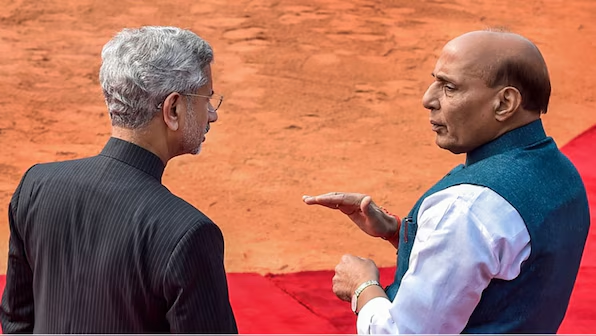Why Enhanced Collaboration Between Rajnath Singh and Jaishankar is Crucial in Modi 3.0

In the context of Modi 3.0, the collaboration between Rajnath Singh, the Defence Minister, and S. Jaishankar, the External Affairs Minister, is crucial for several reasons:
1. Geopolitical Challenges
- China: The ongoing border tensions with China require a synchronized approach between defense and diplomacy to manage and resolve conflicts while maintaining India’s territorial integrity.
- Pakistan: Continuous security challenges and cross-border terrorism necessitate a blend of military preparedness and diplomatic strategies to ensure regional stability.
2. Strategic Partnerships
- Quad and Indo-Pacific: Strengthening alliances such as the Quad (with the US, Japan, and Australia) and engaging in the Indo-Pacific region require a united front. This involves coordinated defense strategies and diplomatic initiatives to counterbalance China’s influence.
- Global Defense Cooperation: Expanding defense ties with countries like the US, Russia, France, and Israel involves both defense procurements and strategic dialogues.
3. Defence Diplomacy
- Military Exercises and Joint Ventures: Enhanced defense collaboration through joint military exercises, defense technology sharing, and co-production agreements need seamless integration between defense policies and foreign relations.
- Peacekeeping and Humanitarian Missions: India’s participation in UN peacekeeping missions and disaster relief operations abroad also requires coordinated efforts between the defense forces and diplomatic channels.
4. Economic and Technological Aspects
- Defense Exports: Promoting India as a defense manufacturing hub and increasing defense exports involve aligning defense production capabilities with international market needs, which requires diplomatic outreach and agreements.
- Technological Cooperation: Collaboration in areas like cybersecurity, space, and emerging technologies needs integrated defense and foreign policy strategies to foster international partnerships and protect national interests.
5. Regional Stability and Influence
- South Asia and Indian Ocean Region: Ensuring stability and asserting influence in neighboring countries and the Indian Ocean region involves diplomatic engagement backed by military presence and readiness.
- Counterterrorism and Maritime Security: Addressing terrorism and ensuring maritime security involve both defense operations and international cooperation through diplomatic channels.
6. Domestic and International Perception
- Unified Government Approach: A cohesive strategy between the defense and external affairs ministries reflects a strong and unified government stance, enhancing India’s credibility and leverage on the global stage.
- Crisis Management: Effective handling of crises, whether military or diplomatic, requires coordinated responses to mitigate risks and manage international perceptions.
In summary, the collaboration between Rajnath Singh and S. Jaishankar is essential for addressing complex security challenges, strengthening strategic partnerships, enhancing defense diplomacy, fostering economic and technological advancements, and maintaining regional stability. Their combined efforts will play a pivotal role in achieving India’s national security and foreign policy objectives in Modi 3.0.